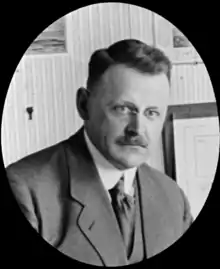Hanso Idzerda
Hanso Schotanus á Steringa Idzerda (26 September 1885 – 2 November 1944) was a Dutch scientist, entrepreneur and pioneer in radio technology.[1]

Between 1907 and 1917 he worked to introduce the already invented triode into radio technology.[1] In 1919 Idzerda invented the triode IDZ-lamp, which was capable of transmitting and receiving radio messages containing the human voice.[1] On 6 November 1919 he held the first public airing of a radio programme.[1] His programme consisted of music, and him talking for a bit in between pieces.[1] The PCGG transmitter he personally invented was capable of transmitting signals from The Hague all the way to England.[1] Herman de Man, later to be an important author and radio maker, was present.[1] From then on the programme aired every week. In 1922 the Daily Mail decided to sponsor Idzerda, who previously financed the operation with his own money and some donations.[1] After the Daily Mail ceased its support Idzerda's company went bankrupt.[1]
On 2 November 1944, a V-2 rocket that was being testing close to his house crashed and Idzerda decided to take a look.[1] He was ordered to leave the area but later snuck back to the rocket and was promptly executed.[1]
References
- Vallinga, Mark (2019-11-02). "Hanso Idzerda: het tragische leven van een radiopionier". Friesch Dagblad (in Dutch). Retrieved 2021-01-06.